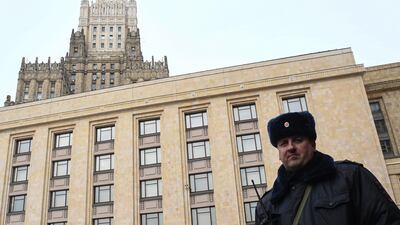Former spy Sergei Skripal and his daughter Yulia, who are in a critical condition after being poisoned on British soil, will die if they are taken off life support because there is no antidote, according to the man who helped develop the nerve agent allegedly used in the attack.
The British government has said that Novichok, a nerve agent developed by the Soviet Union, was used in the March 4 attack. UK prime minister Theresa May also said that it is “highly likely” that Moscow is responsible for the attempted murder.
Vladimir Uglev, a Russian scientist who helped develop Novichok as part of a programme ordered by the Soviet ministry of defence, told Russian news outlet The Bell that the outlook for the Skripals is bleak.
“If Skripal and his daughter received a lethal dose of B-1976, C-1976, or D-1980, then, most likely, they will suffer the same fate as earlier victims," he said.
"There is no antidote to these agents. I can say with nearly 100 per cent certainty that if Skripal and his daughter are taken off of life support, they will die, although they are now only technically alive."
_______________
Read more:
Expelled Russian diplomats fly home from UK in spy poison stand-off
Britain gains Europe's support for Russia spy poisoning showdown
_______________
In a separate development, Russia's foreign minister threatened on Wednesday to retaliate against Britain for "anti-Russian measures", as the two countries remain at loggerheads over the poisoning incident.
Speaking after a meeting with Japanese counterpart Taro Kono, Sergei Lavrov said: "If the British government continues taking some anti-Russian measures, we will hit back under the principle of reciprocity."
Mr Lavrov urged the British government to "respond calmly" over the attack.
"Overall, there is no doubt that the British leadership has knowingly chosen to undermine the British-Russian relationship," said the minister.
Russian President Vladimir Putin has dismissed allegations of Moscow's responsibility as "nonsense". But on Wednesday, British Foreign Secretary Boris Johnson said the trail of responsibility over the attack “inexorably leads back to the Kremlin”.
Britain reacted to the attack by expelling 23 Russian diplomats and their families - around 80 people in total - and has also cut off high-level contacts.
A spokesman for Mrs May said London was "actively considering" other measures.
On Tuesday, the head of the OPCW chemical watchdog said it would take two to three weeks to complete laboratory analysis of samples taken from the poisoning.
The affair has further damaged Russia's already shaky relations with many Western countries.
The EU has expressed its solidarity with Britain and leaders at a summit later this week will agree to "coordinate on the consequences" for Russia, according to a draft statement seen by AFP.
US defence secretary Jim Mattis suggested on Tuesday that Moscow's suspected involvement shows Russia has "chosen to be a strategic competitor".
However, President Donald Trump skipped the issue when congratulating Mr Putin on his re-election and proposed a summit in the "not-too-distant future".
Japanese prime minister Shinzo Abe voiced "outrage" over the attack in a call to Mrs May, according to her office.
Mr Skripal, 66, a former Russian officer who sold secrets to Britain and moved there in a 2010 spy swap, remains in a coma along with his 33-year-old daughter after they were found unconscious on a bench in Salisbury.

